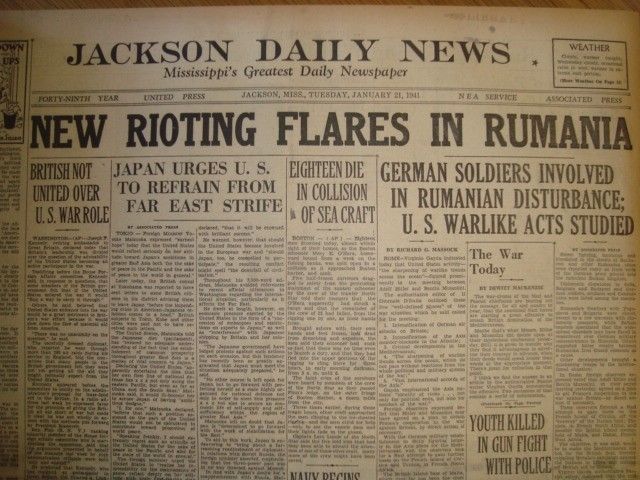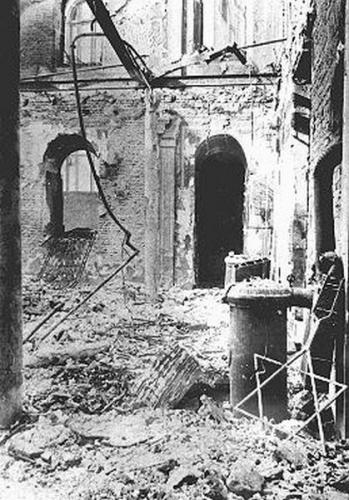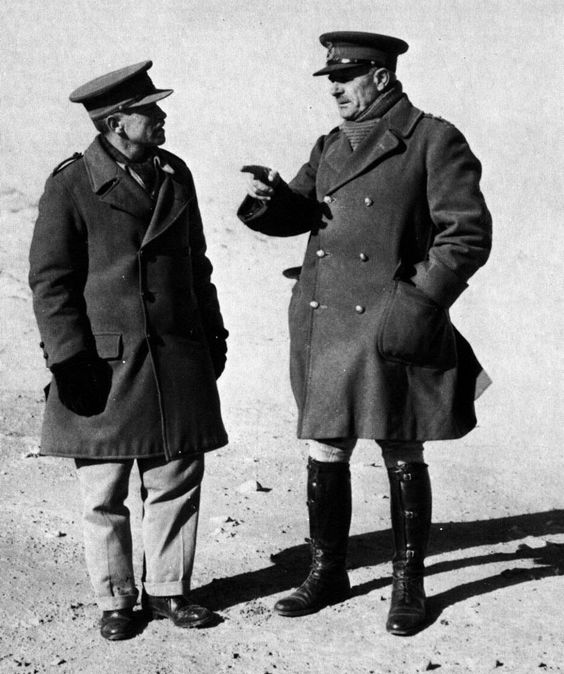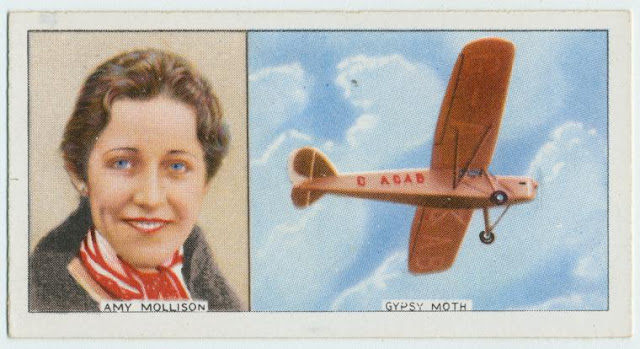Tuesday 21 January 1941
 |
| Troops of the 6th Australian Division going through the barricades at Tobruk on 21 January 1941. |
East African Campaign: The British advance from Kenya and Sudan continues. The 5th Indian Infantry Division (General Lewis Heath) advances 50 miles from Kassala on the border into Eritrea. It captures Aicota, which the Italians have abandoned. The Italians are forming a defensive line beyond the town at Keru Gorge, where the 4th Indian Division ("Gazelle Force") is being held up, so Heath attempts to outflank them to the north.
Brigadier William Slim is injured in the fighting and sent behind the lines. The RAF is active throughout the region, raiding Assab and Massawa, while the South African Air Force chips in with raids on Neghelli and Javello.
European Air Operations: Operations are light due to the weather. The Luftwaffe sends some bombers across, but they only reach the outskirts of London. RAF Bomber Command stays in its hangers after dark. Uffz. Gerhard Blum of 1./NJG 2 shoots down a Blenheim bomber before dawn for his first victory.
 |
| Greeks advancing near Tepelenë in Albania, winter 1940/41. |
Norwegian 7934-ton freighter Korsfjord also likely is a victim of the weather. It collides with freighter Banda Shahpour about 370 km north of Butt of Lewis and sinks. There are 19 survivors and 2 deaths.
The Luftwaffe (Focke-Wulf Fw 200 Condors of KG 40) braves the weather and bombs and sinks 4427-ton British freighter Temple Mead in the shipping lanes west of Ireland. There are 14 deaths. with seven perishing in a lifeboat from exposure, and 27 survivors.
The Luftwaffe also attacks and sinks 487-ton British tug Englishman forty miles west of Tory Island, off the north coast of Ireland. All 17 onboard perish.
The Luftwaffe scores another victory by sinking 4427-on British freighter Temple Mead at Southampton. There are 14 deaths.
German 688 ton freighter Brechsee hits a mine and sinks off Malmö, Sweden.
Convoy FN 389 departs from Southend, Convoy HX 104 departs from Halifax, Convoy BHX 104 departs from Bermuda.
U-763 is laid down.
Battle of the Mediterranean: Operation Compass resumes with a fierce attack by General O'Connor's Australian and British troops against Tobruk. The 2/3rd Australian Battalion leads things off at 05:40. They make good progress, and in an hour they clear a path a mile deep and a mile wide through the barbed wire, tank ditch, and other obstacles. The 16th and 19th Australian Brigades follow through, the first heading north, the other south. British 7th Armoured Division helps with the attack. Italian artillery is strong, but the British artillery responds in kind with suppressing fire.
The Italian 10th Army is a little more active in the defense than they were at Bardia earlier in the month. They have dug-in tanks and machine-gun posts at the key Bardia-El Adem crossroads right behind the line. The Australian troops try to bypass them on right and left, but are met by a counterattack on the left which includes seven tanks supported by infantry and artillery. The men on the right have little difficulty, and those on the left eventually break out after they bring up their own tanks. By the end of the day, the Australians have captured Solero and Mannella and are engaged in a fierce firefight at Pilastrino, all well behind the original line. Between a third and half of the supposedly impregnable base is in Allied hands when operations end for the day, though the port of Tobruk itself remains in Italian hands. Italian General Petassi Manella is captured late in the day but refuses to order his troops to surrender.
The RAF helps out throughout the day. The RAF sends Blenheim bombers to attack ground targets while Hurricanes and Gladiators provide cover. Royal Navy gunboats HMS Gnat, Ladybird and Terror along with three destroyers sit offshore and bombard the Italians throughout the day. Australian destroyer HMAS Vampire sinks 63-ton Italian schooner Diego west of Tobruk. The ten on board, undoubtedly fleeing the Australian attack, are taken as prisoners.
The Italians have warships in the harbor, including the beached armored cruiser San Giorgio, which provides effective covering fire until air attacks set it on fire. However, the Italians are hopelessly outmatched on the ground. While they continue fighting into the night, the Italians' situation looks hopeless.
The Chiefs of the General Staff send Middle East Commander General Archibald Wavell an outline of his new priorities. Due to the Greek refusal to accept British ground troops, Wavell is to proceed to capture Benghazi, as he has wished to do all along. In addition, the Staff wants him to capture the Dodecanese and also create a strategic reserve that can be sent to assist Greece and/or Turkey if Germany invades one or both.
While General Wavell succeeds in another wildly successful attack, British Prime Minister Winston Churchill once again appears to give him short shrift. He chooses today to broadcast a message to the people of Malta:
I send you on behalf of the War Cabinet heartfelt congratulations upon the magnificent and ever memorable defence which your heroic garrison and citizens, assisted by the Navy and above all by the Royal Air Force, are making against the Italian and German attacks. The eyes of all Britain and indeed of the whole British Empire are watching Malta in her struggle day by day, and we are sure that success, as well as glory, will reward your efforts.Governor Dobbie also broadcasts a somewhat less ostentatious message to the people, noting that "We are living in stirring times." After several furious raids in recent days by Fliegerkorps X, there are no attacks today.
Italian freighter Burma is wrecked, apparently by a storm, at Puerto Santa Maria on the Guadalete River in the province of Cádiz, Andalusia. The ship is later salvaged for scrap.
 |
| The 37th Light Anti-Aircraft Regiment has time for a spot of tea as it bombards Tobruk, 21 January 1941. |
German Military: Following his now-concluded discussions with Mussolini, during which he prevailed on his fellow director to induce Spain to enter the war, Hitler once again is feeling optimistic about the prospects of bringing Spain into the war on the Axis side. He has the Wehrmacht issue an order stating:
Possible impending changes in political prerequisites render it necessary to amend earlier instructions and to maintain readiness for "[Operation] Felix" in so far as still possible."As the tone of this order suggests, however, nothing is certain. Everything regarding Operation Felix, the planned attack on the British fortress and naval base at Gibraltar, hinges on Francisco Franco - but he hasn't indicated any change in his opposition to such a decision.
US Military: The US Navy and Marine Corps order 108 Brewster F2A-3 Buffalo fighters to add to the Navy's 11 F2A-1s and 43 F2A-2s. This version is modified for a longer range and to carry two 100 lb (45 kg) bombs. These are the last Brewster Buffaloes ordered by the US military, as Brewster has difficulty keeping to a schedule. However, as happens several times during this period, the military puts in a token order to keep the factories humming while newer and better aircraft are developed. Brewster Buffaloes remain popular overseas, though as yet they have not seen combat anywhere.
Home Secretary Herbert Morrison bans Communist paper Daily Worker under Defence Regulation 2D for hindering the British war effort.
Japanese Government: Japanese Foreign Minister Yosuke Matsuoka delivers a lengthy speech to the Japanese Diet in which he gives a review of the Pacific situation. He emphasizes that, under the terms of the Tripartite Pact with Germany and Italy (and now other European nations), Japan will lead the establish a "new order in greater East Asia." He gives a preview of Japanese war aims by stating that "It is our avowed purpose to bring all the peoples in greater East Asia to revert to their innate and proper aspect...." He also makes clear that Japan views China, or at least Manchukuo (Mongolia) as "inseparable" with Japan. After reviewing relations with all of the other nations of the Pacific Rim, he finally turns to the United States, complaining that:
The United States has evinced no adequate understanding of the fact that the establishment of a sphere of common prosperity throughout greater East Asia is truly a matter of vital concern to Japan. She apparently entertains an idea that her own first line of national defense lies along the mid-Atlantic to the East, but westward not only along the eastern Pacific-but even as far as China and the South Seas. If the United States assumes such an attitude, it would be, to say the least, a very one-sided contention on her part, to cast reflections on our superiority in the Western Pacific, by suggesting that it betokens ambitious designs. I, for one, believe that such a position assumed on the part of the United States would not be calculated to contribute toward the promotion of world peace.He concludes by noting that there is "confusion" throughout the world which could result in the "downfall of modern civilization," and notes that it is the "responsibility" of the United States to maintain the peace.
What is particularly notable about this speech is how it attempts to absolve the Japanese military in an advancer for what might come next. Just as Hitler had opined that his own hands were clean once the British rejected his half-hearted attempts at negotiation in July 1940, Matsuoka goes to great pains to pin not only world peace but the survival of world civilization itself on the United States. This anticipatory blame-shifting is a clear harbinger of the coming war - for anyone who notices.
At the secret session, Prime Minister Konoye makes up his mind about something very important: he announces that Germany will win the war.
 |
| Jackson Daily News, 21 January 1941. |
The defining characteristic of the rebellion at this point is a vicious pogrom carried out against the country's Jews, particularly those in two Jewish Bucharest boroughs (Dudeşti and Văcăreşti). One of the several causes of the rebellion was Antonescu's preference to manage relations with Jewish citizens legally; the Iron Guard would have none of that. Instead, they loot and kill whoever they don't like.
While the Legionnaires, by and large, have the run of the capital throughout the day, there are some soldiers and police who refuse to participate. They are put under arrest. Mircea Petrovicescu, son of the former minister of the interior deposed by Antonescu, is particularly vicious, not just killing Jews but also mutilating and torturing them. There are acts of unspeakable cruelty that appear directly tied to the resentment of Jewish life in general, with a heavy focus on looting Jewish property. It is an orgy of bloodletting that lasts throughout the day and into the 22nd.
Hitler begins to take notice of what is going on. He has many troops in the country preparing for the invasion of Greece (Operation Marita). He has the Wehrmacht instruct them to support the Antonescu government, though without actively engaging in combat.
Bulgaria: No doubt coincidentally considering what is going on in Romania, Bulgaria passes anti-Semitic laws based on Germany's Nuremberg laws. Bulgaria is under intense German pressure to ally itself with the Axis, and this may be a way of ingratiating itself with Hitler. Among many other things, Jews are prohibited from intermarrying with ethnic Bulgarians, and various organizations such as B'nai B'rith are outlawed.
British Homefront: Churchill inquiries into the status of coal deliveries to London, to see if there is any way to increase them during the worst of the winter. He learns that deliveries are down to 250,000 tons per week versus demand of 410,000 tons. He also asks the Ministry of Health to look into what can be done about people made homeless in London. While people are grinning and bearing it, deep resentments are building up beneath the surface that someday will rise to the surface when people vote.
American Homefront: Homelessness is an issue on both sides of the Atlantic. PM Daily reports today that there are several shelters in New York City, including two city shelters, one for men and one for women. Altogether, the shelters can accommodate 7000 people (with many laying on top of each other or sleeping seated on benches). The men at the Municipal Lodging House on East 25th Street are turned out at 5 a.m., rain or shine, and then make their way to their "homes" in the Bowery. The Great Depression lingers, with few jobs to be had.
RKO Studios announces today that Orson Welles' "Citizen Kane" will be released as scheduled despite attempts to blacklist everyone involved in the film by William Randolph Hearst. RKO Pictures studio head George J. Schaefer has had his lawyers review the rough cut of the film, and they have asked Welles to cut three minutes of the film to avoid legal consequences. Despite his contract, which gives him complete control over the picture, Welles has agreed to make the cuts.
Cleveland Indians pitcher Bob Feller becomes the highest-paid pitcher in baseball history, signing for $30,000.
"High Sierra," starring Humphrey Bogart and Ida Lupino, is released.
Future History: José Plácido Domingo Embil is born in the Retiro district of Madrid, Spain. He develops an early interest in music, particularly opera, and by 1961 is performing in a leading role. Later in the decade, he makes his debut at the Metropolitan Opera in New York, and by the 1980s is a household name all across the world. He continues to perform and take on various other roles in the world of opera.
Józef Bednarski is born in Kraków, General Government. He emigrates to the United States shortly after the war. Under the name Ivan Putski, he becomes one of the most famous wrestlers in the World Wide Wrestling Federation (WWF) in the 1970s through the 1980s. He remains a fixture in the sport.
 |
| A synagogue destroyed by the Iron Guard during the riots of 21-23 January 1941. |
January 1941
January 1, 1941: Muselier ArrestedJanuary 2, 1941: Camp Categories
January 3, 1941: Liberty Ships
January 4, 1941: Aussies Take Bardia
January 5, 1941: Amy Johnson Perishes
January 6, 1941: Four Freedoms
January 7, 1941: Pearl Harbor Plans
January 8, 1941: Billions For Defense
January 9, 1941: Lancasters
January 10, 1941: Malta Convoy Devastation
January 11, 1941: Murzuk Raid
January 12, 1941: Operation Rhubarb
January 13, 1941: Plymouth Blitzed
January 14, 1941: V for Victory
January 15, 1941: Haile Selassie Returns
January 16, 1941: Illustrious Blitz
January 17, 1941: Koh Chang Battle
January 18, 1941: Luftwaffe Pounds Malta
January 19, 1941: East African Campaign Begins
January 20, 1941: Roosevelt 3rd Term
January 21, 1941: Attack on Tobruk
January 22, 1941: Tobruk Falls
January 23, 1941: Pogrom in Bucharest
January 24, 1941: Tank Battle in Libya
January 25, 1941: Panjiayu Tragedy
January 26, 1941: Churchill Working Hard
January 27, 1941: Grew's Warning
January 28, 1941: Ho Chi Minh Returns
January 29, 1941: US Military Parley With Great Britain
January 30, 1941: Derna Taken
January 31, 1941: LRDG Battered
2020










